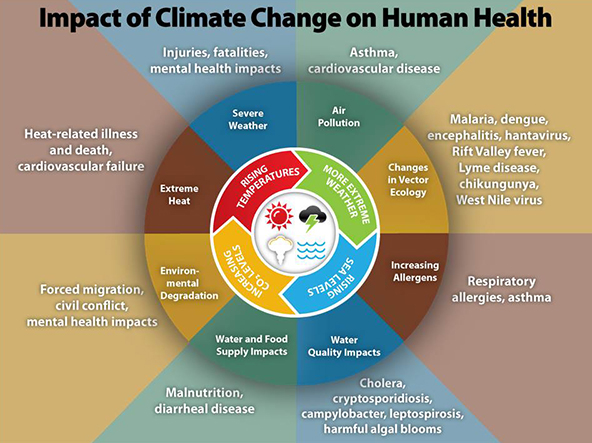“The human symptoms of climate change are unequivocal and potentially irreversible—affecting the health of populations around the world today,” states the Lancet Countdown on Climate Change and Health. Echoing this concern, the Intergovernmental Panel on Climate Change (IPCC)’s sixth synthesis report highlights the need for accelerated climate action to secure a liveable future for all. The distressing repercussions of this reality became acutely evident in July 2023 as extreme heatwaves swept across parts of the Northern Hemisphere, including the US Southwest, Mexico, Southern Europe, and China. Notably, scientists from the World Weather Attribution Initiative concur that these heat-related events would have been extremely rare without the influence of human-induced climate change.
While such revelations spur public discussion of the climate crisis, significant gaps remain in our understanding of the potential impact of climate change on human health — and in our ability to provide concrete evidence of this impact. To drive sustained action by policy- and decision-makers, journalists, and citizens, we need to make a clear and evidence-based causal connection between climate change and human health. Being able to prove this connection requires active and intentional interplay among data, tools, talent, and policy.

The Interplay of Data, Tools, Talent and Policy
Accurate, diverse, and comprehensive data assets including climate, health, infrastructure, socioeconomic, and other data sources captured over extended periods are the bedrock upon which credible attributions of climate change impact rest. Coupled with tools that are fit for purpose and co-developed with relevant stakeholders, these datasets can provide us with profound and useful insights. However, data and tools on their own have little value; they depend on scientific expertise, interdisciplinary collaboration, and innovative thinking to parse the intricacies of the field and transform raw information into actionable knowledge. Additionally, policy plays a pivotal role in this endeavor by enabling evidence-based decision-making and fostering cooperation among different sectors. However, four key challenges currently impede progress in the field and warrant careful consideration. Below, we lay out these challenges and suggest ways to tackle them.
1. Move Beyond Siloed Approaches
First, deciphering the complex attribution puzzle requires the concerted efforts of climate scientists, health researchers, data modelers, analysts, policymakers, and many other experts. However, a persistent challenge hampers our progress; the prevalence of siloed working environments. Siloed approaches can result in wasted resources, time, and effort, and may lead to biased, inconsistent, or conflicting findings. A 2022 Lancet Planetary Health paper reports that fewer than half of the studies on climate change’s impact on mental health were designed or conducted in collaboration with mental health researchers or published in mental health journals, implying gaps in interdisciplinary collaborations. This compartmentalized approach compromises our ability to address the multifaceted challenges posed by climate change.
2. Build a New Breed of Data Science Practitioners
Today, there is limited global technical capacity to conduct detection and attribution studies on climate and health. This limitation curtails our ability to generate robust evidence on the impact of climate change on health on a global scale. Addressing this challenge is crucial and demands a concerted effort to bolster capacity. We need a new breed of data science practitioners at the intersection of climate and health to unlock this potential through a thorough understanding of these and other issues in the climate and health field. This interdisciplinary approach is one of the core tenets of the Capacity Accelerator Network, where, with the support of Wellcome, data.org is building local data science talent across Africa and India. These cohorts of interdisciplinary data science practitioners are being trained to analyze complex data from multiple sources (e.g., climate, environmental, health, demographic, etc.) to generate a robust evidence base to support policy and decision-making processes in government, social impact organizations, and community-based organizations.
India’s National Programme on Climate Change and Human Health (NPCCHH) provides a clear and replicable example of how policymakers could boost the creation of this new kind of practitioner to support national and international efforts to make the connection between climate and health. Launched in 2019 by the Ministry of Health and Family Welfare’s National Health Mission, this initiative derives insights from complex, seemingly disparate datasets. Such initiatives mobilize action by providing directionality for matters of global emergency. Since then, the Ministry has called for state-specific action plans to which several states have responded with strategies and operational frameworks to engage climate and health experts and analyze data from both sectors to drive action. More recently, the Indian government is in the process of hiring data analysts and data scientists to enable various ministries to unlock value from their own datasets and make them accessible to others to generate novel insights.
3. Leverage Strategic Communication and Data Storytelling
Communicating insights in an easy-to-understand and actionable manner can ensure swift action by relevant stakeholders. This requires results from research to be available in accessible formats to laypersons, journalists, government leaders, and other relevant stakeholders. Examples of accessible research might include charts and visualizations, policy briefs, media articles, and short videos. These kinds of communications assets can clarify complex concepts enabling stakeholders to take action, and can also broaden and improve the public conversation about issues that affect everyone, like the impact of climate change on human health.
4. Activate Evidence-driven Policymaking
Finally, climate policies should consider both the scientific evidence and the real-world constraints of policy implementation. A policy-enabling environment demands a strong evidence base. This evidence-driven approach lends weight to policy discussions and might have far-reaching implications. For example, it can significantly bolster cases related to loss and damage, as countries affected by climate-induced health impact can substantiate their claims with clear attribution studies. Moreover, robust evidence on the health repercussions of climate change strengthens the foundation for countries to secure funds for adaptation and mitigation efforts. Such evidence provides a compelling narrative, demonstrating the urgency of action and the real-world consequences that demand financial support. Ultimately, this evidence-driven approach advances the cause of safeguarding public health in the face of a changing climate while also promoting equitable access to resources for adaptation.
As we gear up for COP28 later this year, a historic event that will dedicate a full day to the critical topic of health for the first time, we have an opportunity to underscore the impact climate change has on health. Amid the discourse on the global stage, we must address the current challenges to attribute climate change’s impact on health with a sense of urgency. By addressing these challenges across data, tools, talent, and policy in a collaborative and transdisciplinary manner we will fortify our evidence base, setting the stage for a clear and compelling mandate to demand resolute action from world leaders.
This post has been written with research support by Young India Fellows, Aadya Vatsa, Manan Batra, and Tanmay Sarkar from Ashoka University.
About the Authors
Priyank Hirani is the Director of Capacity Building at data.org, where he strategizes and implements initiatives to democratize data skills and enable social impact organizations to be data-driven
Read moreDr. Felipe J. Colón-González is a Technology Lead in the Data for Science and Health Team at Wellcome.
Read more